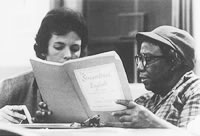|
Tutor Tips - Five Ways Of Reading
 Tutors
in adult education may ask, "How can we do purposeful
reading with our students?" The answer lies in how you
read with your learner. Once you expand beyond the standard
read-aloud approach, you can read anything. Tutors
in adult education may ask, "How can we do purposeful
reading with our students?" The answer lies in how you
read with your learner. Once you expand beyond the standard
read-aloud approach, you can read anything.
- Listening: the student listens and follows along as the
tutor reads aloud. This technique can be used with any level
of material. The tutor can gauge speed by asking the student
if the pace is comfortable. After reading a passage, the
tutor can ask the learner to point out words that she remembers.
The learner can choose words from the passage that she wants
to learn to read, and these words can be placed on a list
or on flashcards.
- Echo Reading: the tutor reads a phrase or sentence and
the student repeats it. This method allows the student to
both see, hear, and say the words. Just as in the listening
approach, students can choose words or sentences they want
to practice by placing them on a list or on flashcards.
- Duet Reading: both the student and the tutor read aloud
at the same time. The student can either read aloud, sub-vocalize
(read under her breath), or just move her lips. The pace
is important. It should be slow enough to allow the student
to keep up yet fast enough to facilitate comprehension.
- Silent Reading: the student reads silently. Silent reading
is the type of reading most readers do. In school, work,
and life, most people are called on to read material to
themselves and then discuss or use the information they
glean. After a learner finishes a reading selection, you
can check comprehension through discussion or a writing
activity.
- Reading Aloud: the student reads aloud to the tutor. Reading
aloud is one way to pinpoint certain difficulties; i.e.
tracking from left to right, word attack skills, and sight
word recognition. Words that give your student difficulty
can be used later for isolated practice.
http://www.ymcaphilly.org/tutor/index_files/page0003.htm
 Print this article
Print this article
View other articles
|

